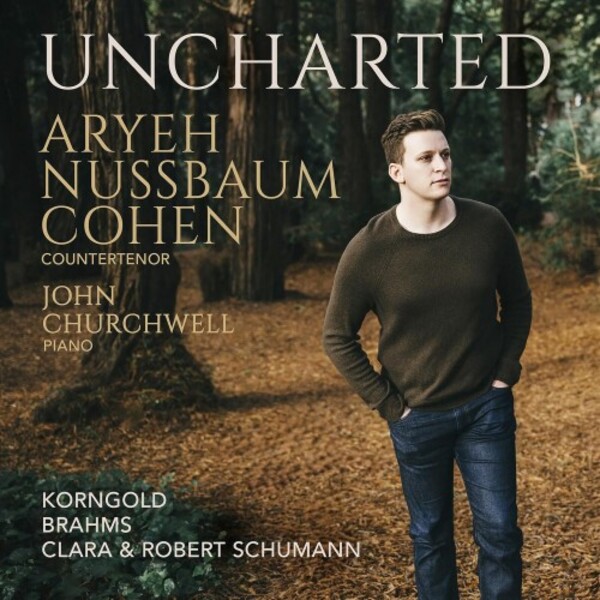Aryeh Nussbaum Cohen: Uncharted
View record and artist detailsRecord and Artist Details
Genre:
Vocal
Label: Avie
Magazine Review Date: 05/2025
Media Format: CD or Download
Media Runtime: 66
Mastering:
DDD
Catalogue Number: AV2742

Tracks:
| Composition | Artist Credit |
|---|---|
| Abschiedslieder |
Erich Wolfgang Korngold, Composer
Aryeh Nussbaum Cohen, Countertenor John Churchwell, Piano |
| (8) Lieder, Movement: No. 7, Mein wundes Herz (wds. Groth) |
Johannes Brahms, Composer
Aryeh Nussbaum Cohen, Countertenor John Churchwell, Piano |
| (6) Lieder, Movement: Ich stand in dunklen Träumen (wds. Heine) |
Clara (Josephine) Schumann, Composer
Aryeh Nussbaum Cohen, Countertenor John Churchwell, Piano |
| (8) Lieder, Movement: No. 8, Dein blaues Auge (wds. Groth) |
Johannes Brahms, Composer
Aryeh Nussbaum Cohen, Countertenor John Churchwell, Piano |
| (6) Lieder, Movement: Sie liebten sich Beide (wds. Heine) |
Clara (Josephine) Schumann, Composer
Aryeh Nussbaum Cohen, Countertenor John Churchwell, Piano |
| (8) Lieder, Movement: In meiner Nächte Sehnen |
Johannes Brahms, Composer
Aryeh Nussbaum Cohen, Countertenor John Churchwell, Piano |
| (6) Lieder, Movement: Der Mond kommt still gegangen (wds. Geibel) |
Clara (Josephine) Schumann, Composer
Aryeh Nussbaum Cohen, Countertenor John Churchwell, Piano |
| (8) Lieder, Movement: No. 8, Unbewegte laue Luft |
Johannes Brahms, Composer
Aryeh Nussbaum Cohen, Countertenor John Churchwell, Piano |
| Liederkreis |
Robert Schumann, Composer
Aryeh Nussbaum Cohen, Countertenor John Churchwell, Piano |
| Myrthen, Movement: No. 3, Der Nussbaum (wds. Mosen) |
Robert Schumann, Composer
Aryeh Nussbaum Cohen, Countertenor John Churchwell, Piano |
Author: David Patrick Stearns
A countertenor singing Korngold lieder? In theory, no repertoire is off limits to any voice type – as long as artistic purpose and cultivated comprehension are the driving forces behind it. Curiously, countertenor Aryeh Nussbaum Cohen projects little of the authority he exudes when singing the title-role in Handel’s Guilio Cesare in this collection of Korngold, Brahms and Robert and Clara Schumann songs. Instead, Zen-like neutrality prevails. For lack of a strong interpretative stance, words are served only in the most generalised way. Vocal lines are steamrollered by his rich, mezzo-soprano colouring; the interesting poetic irregularities in Korngold’s ‘Dies eine kann mein Sehnen nimmer fassen’ from Lieder des Abschieds become less detectable. Also lost is the music’s tension, the sense of being trapped by longing that’s so much a part of this music’s hot-house era.
The lack of vocal precision is curious: any early-music singer such as Nussbaum Cohen is obliged to navigate intense coloratura, but lieder demands a different kind of flexibility that creates a foundation for the words, not something that envelops them. French countertenor Philippe Jaroussky has his words vs music priorities in order on his excellent ‘Green’ album (Erato, 5/15) that has him singing Debussy, Fauré and Hahn in his native language, but less so on his recent, more tentative all-Schubert programme (1/25), suggesting that a visceral relationship with the language is a fundamental art song requirement.
That said, more strictly structured Brahms songs fare better with Nussbaum Cohen, dictating shorter phrases contoured with more specificity. Alternating between Brahms and Clara Schumann, a dialogue about their suppressed affections emerges between the ardent verses chosen by Brahms and the more haunted but detached observations in Schumann’s songs, such as ‘Sie liebten sich beide’ with its words ‘They loved each other, but neither wanted to tell the other’.
With Robert Schumann, Nussbaum Cohen is at his best when his legato line rides the waves of Schumann’s most liquid accompaniments such as in ‘Der Nussbaum’. Liederkreis, however, shows him only intermittently engaged. The undifferentiated tone in ‘Waldesgespräch’ has little sense of the two distinct voices in the song. The wistfulness of ‘Die Stille’ somewhat comes alive thanks to a conversational quality in the singing. But the most famous song, ‘Mondnacht’, seems to be merely vocalised. Amid careful, indulgent accompaniment by John Churchwell, there’s such a sameness in much of the rest of the disc that the second Nussbaum Cohen leaps into his upper range, one’s ears perk right up (though only momentarily). It’s impossible to recommend alternative recordings of this repertoire with countertenors because, as the title reminds us, this is uncharted – and still is.
Discover the world's largest classical music catalogue with Presto Music.

Gramophone Digital Club
- Digital Edition
- Digital Archive
- Reviews Database
- Full website access
From £8.75 / month
Subscribe
Gramophone Full Club
- Print Edition
- Digital Edition
- Digital Archive
- Reviews Database
- Full website access
From £11.00 / month
Subscribe
If you are a library, university or other organisation that would be interested in an institutional subscription to Gramophone please click here for further information.




